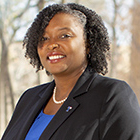Living The Dream | Living the Dream
Moment of Truth
“It’s a paper she can’t finish, or else she’s on overload from juggling her job and school,” thought newly-appointed accounting professor Dr. Veronda Willis when the young Hispanic woman hesitantly requested a private conference after class. But Dr. Willis was about to hear a very different story—one that would demand of her, in this first semester on faculty at the University of Texas, San Antonio, something so extraordinary that a professor could go an entire career without ever facing it.
Speaking slowly and carefully at first, the student sketched out a disturbing tale. Working in her first accounting job, she had uncovered unmistakable evidence of serious financial fraud in her organization. The evidence pointed clearly to a culprit. It was her boss.
Confused, scared, and unsure of what to do—but keenly aware of the perilously high stakes for everyone—the woman had reached out to the one person she believed she could trust and rely on: her accounting professor, Dr. Willis.
For Dr. Willis, it was a moment of truth. Having enjoyed a successful career in accounting, first at a global firm and then in a major corporation, she had finally succumbed, some six years earlier, to the nagging urge to become a professor. Having come to cherish the assignment of training new employees for her employer, she had realized that as much as she loved accounting, the influence she could exert on the profession was still limited by the number of hours she could work. But by becoming a professor, she knew, her influence could be virtually limitless. She could, as she phrased it later, “be an influencer.”
Dr. Willis’s last employer had been Enron, and that company’s dissolution, after she had left her well-paying position, sold her home, and moved from Houston to Boulder to earn a doctorate, left a deep impression. In every class she taught, first as a teaching assistant and now as a professor, she had stressed ethics, by developing hypothetical situations for her students to work through.
Now that focus on ethics had led a student to step forward bravely with exactly the kind of situation that Dr. Willis had been trying to prepare her students to face. She had just one chance to get it right, as the woman sat there waiting for guidance.
The student had turned to the right source for help. First, Dr. Willis calmed the woman, assuring her that the law would afford her full protection for doing the right thing. Then, she advised her student on the next course of action.
The student followed Dr. Willis’s advice. She diplomatically approached her supervisor to confirm that she had indeed interpreted the facts correctly. Then she summoned her courage and went over her head, to tell senior-level management. The Board of Directors soon stepped in. An investigation unfolded, and when it was over, her boss was terminated. Throughout the semester, Dr. Willis continued to advise and support her student.
When it was all over, the student wrote in an e-mail, “I consider myself a very lucky student for having you as one of my professors. You’ve made me feel like your students are important to you.”
“When I work on ethics issues with my students in class,” says Dr. Willis, “it’s not like I can tell them what to do. But I can prepare them for situations they might face. In accounting, there are areas where there is not always a clear ‘right’ or ‘wrong’ answer. You have to make choices, and you want them to be the right choices.”
“And as a professor,” she adds, “you want people to know when it is time to make a choice—and when it is time to speak out.”
The dream continues…
Dr. Willis is now an Associate Professor of Accounting at the University of Texas at Tyler (her hometown) and continues to influence and mentor students regularly, if not in the dramatic manner of her whistle-blower student, who eventually left her position voluntarily and is now successfully employed elsewhere. Dr. Willis presents her research at numerous conferences and she has been published in various accounting journals such as Accounting, Organizations & Society, Issues in Accounting Education and Oil & Gas Quarterly. She conducts financial reporting research in the deregulated electric utility industry and in accounting education. She currently serves as the faculty advisor for the UT-Tyler Beta Alpha Psi Chapter and is Associate Director of the Hibbs Institute for Business & Economic Research. In 2010, she received the Outstanding College of Business Faculty Award from the UT-Tyler Alpha Chi Chapter.

